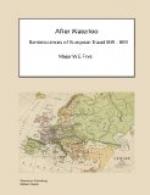In the time of Leopold the factious nobility were kept in check, and the industrious classes, mercantile and agricultural, encouraged. The peasantry were, and are, the most affluent in Europe; and this is no small incitement to the industry that prevails. On the elevation of Leopold to the throne of the Caesars, the present Grand Duke succeeded in Tuscany; and he followed the same system that Leopold did, and was equally beloved by his subjects. Tuscany was the only country in Italy that did not desire a change at the period of the French conquest, and the only state wherein the French were not hailed as deliverers. The Tuscans exhibited a very honorable spirit on the occasion of Buonaparte’s visit to the Grand Duke in 1797. They went together to the Theatre della Pergola, and on their entering into the Grand Ducal box, the Grand Duke was hailed with cries of Viva il Nostro Sovrano: now this proof of attachment at a period when Buonaparte was all-mighty in Italy, when the Grand Duke was but an inferior personage, at a time too when it was doubtful whether or not he would be dethroned, and in the very presence of the mighty conqueror, reflects great honor and credit on the Tuscan character. Buonaparte was much struck at this proof of disinterested attachment on the part of the Florentines towards their Sovereign, and told the Grand Duke very ingenuously that he had received orders to revolutionize the country, from the French Directory; but that as he perceived the people were so happy, and the Prince so beloved, he could not and would not attempt to make any change.
The applause given to the Grand Duke at this critical period is so much the more creditable to the Florentines as they in general receive their Prince, on his presenting himself at the theatre, with no other ceremonial than rising once and bowing. There is no fulsome God save the King repeated even to nausea, as at the English theatres. In fact none of the Italians pay that servile adulation to their Sovereigns that the French and English do.
The changes projected in Italy at the treaty of Luneville by Napoleon then first Consul, and his further views on Italy, induced him at length to eject an Austrian Prince from the sovereignty of a country which he intended to annex to the French Empire. The Grand Duke was indemnified with a principality in Germany, where he remained until the downfall of Napoleon in 1814; subsequent arrangements again restored him to the sway of the land he loved so well, and he returned to Florence as if he had only been absent on a tour, finding scarcely any change in the laws and customs and habits of the country; for tho’ Tuscany was first erected into a Kingdom by the title of Etruria, and afterwards annexed to the French Empire, the institutions and laws laid down by Leopold and followed strictly by his successor were preserved; very little innovation took place, and the few innovations that were effected were decided ameliorations; for the Emperor Napoleon




